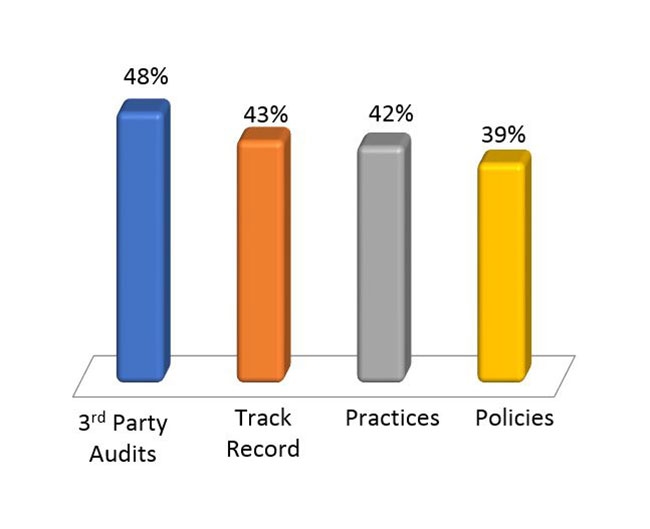
How is sustainability linked to public trust?
By Crystal Mackay
Features Business & Policy Consumer Issues annex Canada Consumer relations Consumer trends Perspectives Sustainability Elements Canadians feel demonstrate transparency.
Elements Canadians feel demonstrate transparency. I first heard the word ‘sustainable’ in university many moons ago. It seemed academic, and the right thing to do as we studied agriculture and how to feed the world in the future. Then I didn’t hear that word for about a decade.
Once it resurfaced, there were a lot more questions than answers – from how you define sustainability to what do we do about it.
As poultry farmers and industry partners have always strived to continuously improve their practices, maybe this is just labelling what’s already being done?
Many companies globally were quick to make sustainability commitments, speeding past some agreed upon definitions of what it actually means. Some even adopted new program requirements. Canadian poultry sectors were quick to walk down the sustainable path as well, making commitments to ‘doing the right thing’ with a bigger picture lens on sustainable balance. But why?
The Canadian Federation of Agriculture’s new Public Trust Steering Committee met with farm and food system leaders from across Canada. Together, they determined the best foundation for earning public trust in food and farming lies in a coordinated approach between three pillars: doing the right thing; trusted assurance systems; and communications to share the good work. Focusing efforts on just one of the three pillars alone will not lead to public trust, the base the agri-food sector needs to grow and thrive in the future.
For example, Canadian poultry farmers have invested millions of dollars in improving the environment through Environmental Farm Plans, Nutrient Management Plans and many other efforts. Yet, when the Canadian Centre for Food Integrity (CCFI) asks Canadians, “Do you feel farmers are good environmental stewards?” only one third of respondents agree.
There is clearly a disconnect between the good work producers are doing for the environment and consumer awareness. To move the bar forward, farmers need to communicate and engage with the public on issues of sustainability in a meaningful way.
The 2017 CCFI public trust research took a deeper dive into transparency. What information specifically is the Canadian consumer looking for that will help earn trust? The transparency model tested showed that consumers are looking for accurate information from credible sources. The sharing of information and use of third party audits, practices, policies and track record all add up to increased transparency, which leads to trust.
What drives public trust?
To build trust, those in the food system must demonstrate that while systems have changed, and the use of technology has increased, the commitment to doing what’s right and sustainable has never been stronger. Confidence (shared values) is three-to-five times more important than competence (skill and expertise) in building consumer trust.
Every sector of the food system, whether farmers, manufacturers, branded food companies, grocery stores or restaurants, is under ever-increasing pressure to demonstrate they are operating in a way that is consistent with stakeholder values and expectations. Groups opposed to today’s food system practices are pressuring the largest food brands and initiating legislation to change how the system operates in all facets of sustainable food production and marketing.
Historically, when under pressure to change, the industry has responded by attacking the attackers or the specific issue under fire and using science to justify current practices. We should not confuse scientific verification with ethical justification. Not only are these approaches ineffective in building stakeholder trust and support but they also increase suspicion and skepticism that the food industry is worthy of public trust.
Building a truly sustainable food system requires balance. Maintaining public support requires our practices to be ethically grounded and consistent with the values of our stakeholders. Objective, independent data is essential to evaluate progress and support scientific claims of improvement. Reasonable profitability is essential to assure economic viability.
It is only by balancing these sometimes-competing interests that we can have a food system that is truly sustainable and supported by our stakeholders and most Canadians who want to enjoy poultry products.
Crystal Mackay is president of the Canadian Centre for Food Integrity. For Canadian consumer insights on public trust in food and farming visit, www.foodintegrity.ca.
Print this page